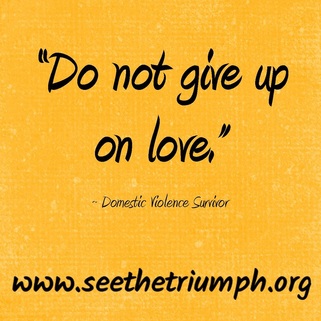|
By Christine Murray, See the Triumph Co-Founder
After experiencing abuse in an intimate relationship, it’s normal to have fears and worries about not being able to find a safe, healthy relationship. After all, someone who has been abused knows firsthand the risks and the potential ugly side of relationships. Most relationships that are abusive don’t start out that way--they often start out with the same hopes and dreams that people hold for any intimate relationship. And, many abusers use affection, attention, and romantic gestures to win the loyalty and devotion of their partners, so survivors may find it very difficult to interpret these same behaviors in a potentially healthy relationship. One of the first messages we want to convey during this series on safe, healthy relationships following abuse is the importance of holding out hope that these relationships are possible, even after someone has experienced an abusive relationship. We know that this hope can be very difficult for some people, especially if they’ve observed and experienced lifelong patterns of abuse in their families and communities. We also know that some survivors will make the choice to fully abstain from intimate relationships themselves in light of the abuse they experienced, and we believe that this is a perfectly valid and understandable choice. However, even if people decide they don’t want to participate in intimate relationships themselves, we still encourage them to hold on to a positive, hopeful view of relationships, especially so that they can help to support and understand the experiences of their friends and family members who are in relationships. So, how can someone who has experienced the darkest possible side of relationships in their own lives hold out hope for positive relationships? One way is to see examples of others who have faced abuse and went on to find safe, healthy relationships after those abusive relationships ended. We’re thankful that many survivors who have participated in our research have shared examples of this. Take some time to read through the following list of quotes from participants in our research studies, who shared their own experiences of finding positive relationships after they’d faced abuse:
As these quotes demonstrate, survivors are often pleasantly surprised to find the potential for safe and healthy relationships after their experiences with abuse. Furthermore, these survivors’ quotes demonstrate the importance of finding partners who are caring and thoughtful in providing support and patience for their partners, especially when lingering effects of the abuse surface. Beyond learning from the survivors quoted above, another way to find hope for positive relationships is to search for them among the people you know, including friends, family members, co-workers, and people involved in the groups and organizations you’re a part of. Remember not to look for perfection, as every relationship will surely have some positive and negative dynamics. However, to the extent possible, try to identify positive, supportive, safe, and nurturing relationships among the people you know, and talk with those people about what they’ve learned through their relationships that might be helpful to you in your own relationships. In conclusion, another survivor in our research shared the following powerful words: “Do not give up on love. There are good people out in the world. Try not to be tainted by the abuse you have experienced. I am sure that on the whole, most people are kind and genuine. Tell yourself, every day, that you are worthy of love and respect.” To be certain, holding out hope for the possibility of safe, healthy relationships after one or more abusive relationship is no easy task. However, this hope is so important for being able to nurture an important area of many people’s lives--the goal of fostering connection and intimacy through a stable, safe, loving relationship with another person. Comments are closed.
|
Archives
July 2024
CategoriesAll About Intimate Partner Violence About Intimate Partner Violence Advocacy Ambassadors Children Churches College Campuses Cultural Issues Domestic Violence Awareness Month Financial Recovery How To Help A Friend Human Rights Human-rights Immigrants International Media Overcoming Past Abuse Overcoming-past-abuse Parenting Prevention Resources For Survivors Safe Relationships Following Abuse Schools Selfcare Self-care Sexual Assault Sexuality Social Justice Social-justice Stigma Supporting Survivors Survivor Quotes Survivor-quotes Survivor Stories Teen Dating Violence Trafficking Transformative-approaches |
Search by typing & pressing enter



 RSS Feed
RSS Feed